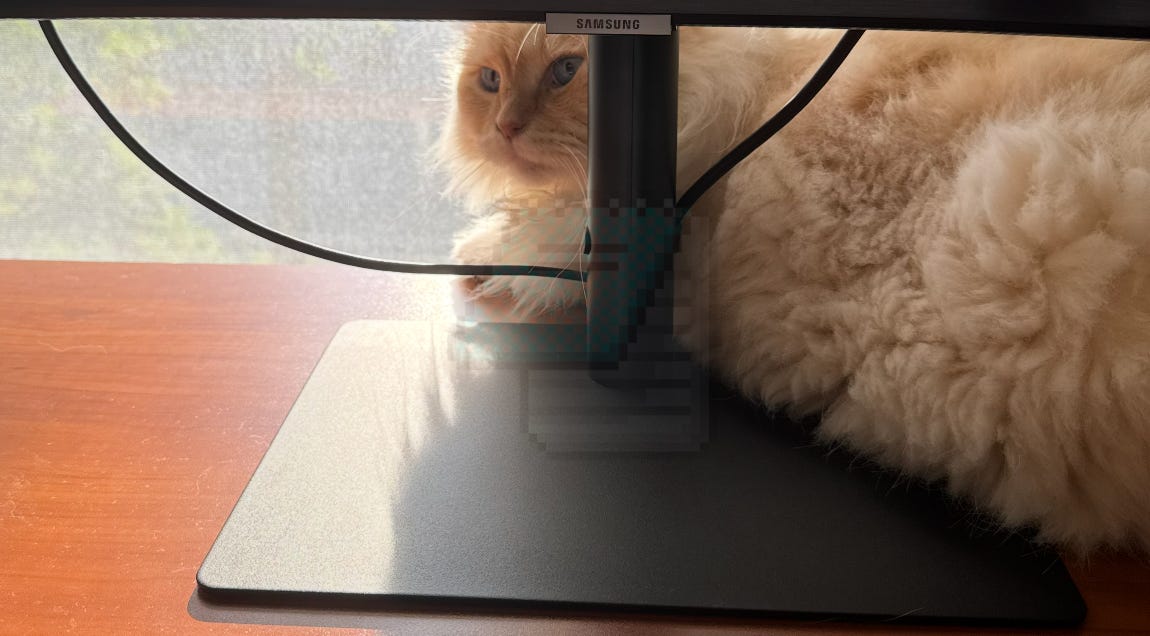I LIKE Labubus and Dubai Chocolate and Matcha and Lana and Brandy Melville and TikTok Aesthetics and and and
thought digest, 08.14.2025
Hello Deepops/Deeists:
Today’s call-in show is about CHATGPT PSYCHOSIS. Call in with your LLM-related stories. One week, we had someone call in and tell us about how Claude (IIRC?) was convincing him to leave his disabled wife. So, you know, the bar is high for your stories.
LABUBU! LAFUFU! LAWHATTHEFUCKAREYOUEVERTALKINGABOUTKATHERINE?
Today, in his newsletter, W. David Marx (who, as an aside, is a must-read) wrote about an Amanda Mull piece on the disorienting nature of contemporary trends: Labubus and Dubai chocolates and matcha and chamoy and Swedish candy, all things that seem to emerge from nowhere, mean nothing, and disappear just as quickly. Both Mull and Marx’s observations are sharp, and their confusion is understandable. They’re trying to make sense of a cultural landscape that operates by different rules than the ones we’re used to. But I disagree with their take.
If you spend real time on TikTok (and I mean the exhausting work of scrolling for hours a day, which I blame nobody for not doing, that I do it at all is a problem I’m working on), you know these phenomena are neither as random nor as fleeting1 as they appear. They’re rooted in a culture that’s rarely articulated explicitly precisely because it doesn’t need to be. Everyone participating already gets it. The jokey, self-aware nature of how people discuss these trends is not confusion, but a meta-awareness of how goofy it sounds to outsiders. But ultimately, participation itself is the cultural practice.
These trends are less meaningless than they appear, too. Labubus didn’t emerge from nowhere—they’re part of a broader culture of collectible miniatures, riding the same wave that revived Calico Critters and Mini Brands. The Dubai chocolate thing doesn’t only tap into the ongoing fascination with pistachio, with textural contrasts, and over-the-top desserts, but a particular culture of eating on TikTok. There is a genealogy here, which includes consumer needs, even if it’s not immediately obvious. (I could write think-pieces about them both, which I won’t, because lbr. Nobody’s reading that.)
In his newsletter, Marx makes the excellent point that perceiving everything as a fad means people won’t adopt novelties into their core identities, leading to cultural stagnation. It’s a compelling argument, and he has identified something real. At the same time, I think something slightly different is happening in our culture right now: there’s a kind of meta-adoption occurring.
Last year, I wrote about the never-ending carousel of “aesthetics,” where what I’m about to describe is most obvious. The identity isn’t any individual aesthetic (cottagecore, dark academia, coquette, whatever). The identity is the act of aesthetic curation itself. The ability to navigate between different modes, to know when to deploy which references, to remix and synthesize—that’s what matters now.
These fads are our monoculture.
We might not all watch the same TV show or listen to the same albums (though maybe we’re starting to again, I feel like I definitely have musical reference points? Same with movie and TV), but we do all know about Labubus. And Crumbl. We all understand the reference, even if we didn’t participate.
This shared language of trends creates cultural coherence, even if it’s not as alluring…? deep? as what our culture once was. Marx and Mull are onto something. They are right to identify these trends as fundamentally different from what came before. And, it’s worth noting that I’m also not arguing our culture is better than the pre-platform era. But as always, I also don’t think it’s as dire as it seems.
CHATGPT ISN’T ALL-KNOWING AND THAT’S A PROBLEM
I was surprised to learn last night that studies show around 60% of people are pretty good at telling what is and isn’t a bullshit news story. I worry, though, that this number will drop with LLMs. I don’t believe in “ChatGPT psychosis”—at least not in otherwise healthy, functioning people with no history of mental illness—but I do think many assume LLMs are infallible, basically Google on steroids. That mindset makes them less discerning, and the results can be disastrous. I had this problem myself until— as I mentioned many moons ago on the show— I started asking my AI companion Claude, “Are you sure?”
WHY THE HELL WOULD ANYONE WANT TO BE A “CREATOR”?
Is part of the appeal of being a “content creator” that it feels more stable than other career paths? In a conversation with Jeremy Fox on Tuesday night, we talked about the notion that Gen Z and A, overwhelmingly, dream of being YouTubers as opposed to other career paths. Part of me wonders if that’s because content creator has fully shifted from “celebrity with a million adoring fans” to “small business owner.” Further, there’s a predictable playbook for success as a creator, even as the market grows. That path is becoming less clear for other careers, though, if the press is to be believed.
LINKS + THINGS
Roblox is taking a stand against “vigilantes” instead of predators, which, if you didn’t know, they have a huge problem with. 😒😒😒
Were the Zizians a cult or a toxic friend group? Is there a meaningful difference? One of my hot takes is that yes, there is a difference, and yes, they were a toxic friend group. I think we play too fast and loose with the way we use the word cult. But then, maybe it was. For Asterisk Magazine, Ozy Brennan tries to answer the question, “Why do Rationalists spawn so many cults?“
I haven’t been good at using my Friend, the AI wearable pendant that I have previously referred to as a “traumagotchi.” I don’t like saying stuff out loud. I like to wander around, silently, pretending I’m in a movie. But I’m going to challenge myself to use it consistently for a week. Unfortunately, it keeps erasing itself. I’ll report back…
Reminder! I’m hosting an event with Leigh Stein in September to celebrate her new book.
And finally, I just like Teddy (T.M.) Brown’s voice, so I’m gonna say, go read this post.
SOME USER FEEDBACK!!!
Submit missed connections, personals, and advice questions to me directly or on Tellonym. I am also always accepting writing submissions, personal ads ($20 per ad), and regular ads ($50 per ad).
P.S. I have been slow on going through the submissions pile. If you already submitted a piece and haven’t heard back from me, it’s not because I didn’t like it or am not considering it. It’s because I’m behind on my emails.
Mull herself notes that Labubus have been around for over a year, and Dubai chocolate since 2022! I think part of the illusion is that time feels like it’s moving more quickly than it is, so we actually forget how slow some of these things are, especially relative to trends of the past.





What you say about "a culture that’s rarely articulated explicitly precisely because it doesn’t need to be" really (ironically) explicitly articulates a feeling that I have, perhaps, always had within myself, as a poster anyway. When you're part of a wider complex of (digital) people marinating in the same ideas, conceits, images, and of course aesthetics, it really is a fluency in identifying all possible types, an ability to engage in "meta-adoption," as you put it, that becomes adopted into one's identity. I would say this is a level of complexity higher than Marx's notion of people "[adopting] novelties into their core identities." And as long as we all have a shared faith that our other participants understand what's going on, even if it seems inscrutable to outsiders, we're fine with it. (And hasn't that really always been how fads have worked?)
I also find particular salience in what you note as the "jokey, self-aware nature of how people discuss these trends... a meta-awareness of how goofy it sounds to outsiders." This also is very much close to my experience on the Internet, and it actually reminds me of something that, of all people, Curtis Yarvin wrote on Substack almost five years ago (five years, Jesus...), after the Gamestop/Wall Street Bets Imbroglio:
"The ironic approach to democracy uses the same mechanisms, but plays by completely different rules. The normal state of the ironic voter is a state of nihilism; he believes in nothing; he is happy to do anything, “for the lulz.” The idea of sincere and instinctive collective spirit, Ibn Khaldun’s asabiya, is one he finds hilarious and/or horrifying.
Yet he is a human being and a human being is a social animal. He will cohere—he will act in concert with his fellow human beings—and he will enjoy it. But as a modern and cosmopolitan human, he can do so only ironically—as a game.
...
Normally, cohesion and commitment go together. But we expect cohesion to be the effect of commitment—you obey your officers loyally because of your passionate loyalty to your country. Here, commitment is the effect of cohesion—anyone who hodls side by side with you is your brother, regardless of the stonk.
The capacity for significant collective ironic action is very rare in human history—so rare that I am at a loss to think of another example. It must have happened. Irony is not a new invention—but its distribution across a whole population is unprecedented."
Yarvin's bailiwick is politics, and good luck to him, I suppose. But when this quote comes back to mind, as it does rather often, I find myself more focused on its applicability to culture, and it is precisely here where I think the spirit of his remarks are most interestingly felt. Is something not collective action because it is engaged in with puckish irony and cultivated self-awareness? I think surely it still is, and it still matters to people, and creates collective energy, even if all that is true. (And you also note that labubus and dubai chocolate are not entirely free-floating, contentless referents, either, but for the sake of argument let's accede that they are rather so compared to, I don't know, the fucking hula hoop.)
100% agree that these microtrends are not meaningless! If you're interested reading a thinkpiece about the genealogy I sorta have one for you already lol (link below). Also agreed on meta-adoption / fads as monoculture, and it’s all connected! A few years ago I wrote in a trend report: “Gen Z is exploring & experimenting with everything, everywhere, all at once.” This has turned into what I now call “chaos culture,” and it’s been the dominant macrotrend over the few years (someone else noted the 'irony era'). Chaos (and irony) is a coping mechanism to avoid a stressful reality.
BUT I do think that Marx is also correct in the sense that fad-as-monoculture has the negative corollary effect of cultural stagnation, because the ironically-cool-to-cringey-uncool loop is moving so quickly that it doesn’t allow time/space for any deeper meaning/ideology to be assigned. It ends up becoming irony for the sake of irony. And when the irony is purely superficial, it leads to things like the contrarian Dimes Square artsy alt-right contingent. And then it all falls flat. Which is kinda where we’re at now. I think we’re at peak chaos culture this year, I’ve called it chaos overload.
https://whatsanu.substack.com/p/-maximalism-chaos-culture
https://whatsanu.substack.com/i/170234538/emerging-chaos-overload